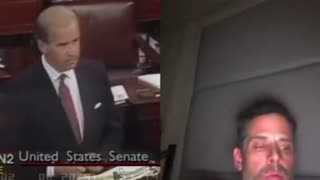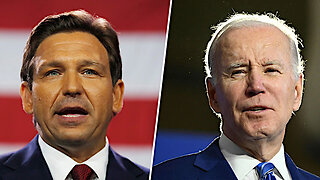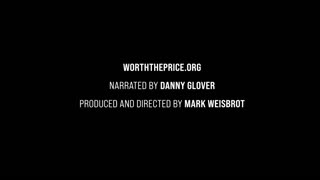Joe Biden vs. Scott Ritter: Iraq Chemical and Biological Weapons (1998)
Beginning in December 1997, Ritter, with the approval of UNSCOM head Richard Butler and other top UNSCOM leaders, began to supply the UK's foreign intelligence service MI6 with documents and briefings on UNSCOM's findings to be used for MI6's propaganda effort dubbed "Operation Mass Appeal": "I was approached by the British intelligence service, which I had, again, a long relationship with, of an official nature, to see if there was any information in the archives of UNSCOM that could be handed to the British, so that they could in turn work it over, determine its veracity, and then seek to plant it in media outlets around the world, in an effort to try to shape the public opinion of those countries, and then indirectly, through, for instance, a report showing up in the Polish press, shape public opinion in Great Britain and the United States.
"I went to Richard Butler with the request from the British. He said that he supported this, and we initiated a cooperation that was very short-lived. The first reports were passed to the British sometime in February of 1998. There was a detailed planning meeting in June of 1998, and I resigned in August of 1998. [...] This is an operation—Operation Mass Appeal, that had been going on prior to UNSCOM being asked to be the source of particular data, and it's an operation that continued after my resignation."
In January 1998, Ritter's inspection team in Iraq was blocked from some weapons sites by Iraqi officials who stated that information obtained from these sites would be used for future planning of attacks. UN Inspectors were ordered out of Iraq by the United States Government, shortly before Operation Desert Fox attacks began in December 1998, using information which had been gathered for the purpose of disarmament to identify targets which would reduce Iraq's ability to wage both conventional and possibly unconventional warfare. UN Weapons Inspectors were thereafter denied access to Iraq. Ritter spoke on the Public Broadcasting Service show, The NewsHour with Jim Lehrer:
I think the danger right now is that without effective inspections, without effective monitoring, Iraq can in a very short period of time measured in months, reconstitute chemical and biological weapons, long-range ballistic missiles to deliver these weapons, and even certain aspects of their developing of nuclear weapons. program.
When the United States and the UN Security Council failed to take action against Iraq for their ongoing failure to cooperate fully with inspectors (a breach of United Nations Security Council Resolution 1154), Ritter resigned from the United Nations Special Commission on August 26, 1998.
In his letter of resignation, Ritter said the Security Council's reaction to Iraq's decision earlier that month to suspend co-operation with the inspection team made a mockery of the disarmament work. Ritter later said, in an interview, that he resigned from his role as a United Nations weapons inspector over inconsistencies between United Nations Security Council Resolution 1154 and how it was implemented.
The investigations had come to a standstill, were making no effective progress, and in order to make effective progress, we really needed the Security Council to step in a meaningful fashion and seek to enforce its resolutions that we're not complying with.
On September 3, 1998, several days after his resignation, Ritter testified before the United States Senate Committee on Armed Services and the United States Senate Committee on Foreign Relations and said that he resigned his position "out of frustration that the United Nations Security Council, and the United States as its most significant supporter, was failing to enforce the post-Gulf War resolutions designed to disarm Iraq." Ritter said that Secretary of State Madeleine K. Albright had supposedly "blocked more inspections in 1997 than Saddam Hussein did," a charge which Albright disputed.
During the testimony on September 3, 1998, Ritter was asked by Senator Joe Biden about his position on inspections, which Biden criticized as "confrontation-based policy." According to Barton Gellman, Biden questioned if the inspector was trying to "appropriate the power 'to decide when to pull the trigger' of military force against Iraq," with Biden stating that the Secretary of State would also have to consider the opinion of allies, the UNSC, and public opinion, before any potential intervention in Iraq. Later on, Biden stated that the decision was "above [Ritter's] pay grade." According to Gellman, Senate Democrats joined Biden and "amplified on the Clinton administration's counterattack [against] Scott Ritter" with exceptions such as John Kerry, while Senate Republicans "were unanimous in describing Ritter's disclosures as highly damaging to the credibility of the Clinton administration on one of its core foreign policies."
-
 1:19
1:19
@7THSN1PER
10 months agoJoe Biden💥VS💥Hunter🤪Biden😎Smoking🚭Crack💥🤣🍺
20 -
 8:00
8:00
We love people muscle cars in America join us in the adventure
4 months agoHunter Biden vs. Steve Bannon lets see how they compare when not going to #congress when ordered
339 -
 2:36
2:36
RealAmericasVoice
2 years agoJOE BIDEN LOSING THE DRUG WAR
1271 -
![WAR ROOM [FULL] Monday 10/3/22 • Joe Biden Authorizes Bio Weapons, NIH Invests in New COVID Research](https://hugh.cdn.rumble.cloud/s/s8/1/e/g/j/3/egj3f.0kob-small-WAR-ROOM-FULL-Monday-10322-.jpg) 2:02:54
2:02:54
RonGibsonChannel
1 year agoWAR ROOM [FULL] Monday 10/3/22 • Joe Biden Authorizes Bio Weapons, NIH Invests in New COVID Research
36 -
 0:35
0:35
Obscured Trends
3 years ago $1.54 earnedJoe Biden vs Donald Trump (ROUND 1)
2.2K3 -
 3:07
3:07
PerfectSociety
5 months agoRon DeSantis VS Joe Biden MUST SEE! SPREAD LIKE NATURALLY ACQUIRED HEALING ANTIBODIES!
344 -
 1:18:58
1:18:58
DRUNKTurkeyShow
4 months agoBorder Crisis: Joe Biden Vs Gregg Abbott Texas Battles To Defend From Invasion #bordercrisis #usa
224 -
 13:36
13:36
iamthe1
8 months agoJoe Biden and the Launch of the Iraq War
37 -
 5:05
5:05
Adriadna
1 year agoTrump vs Biden Civil war
10 -
 1:47
1:47
UNCENSORED MED!A 🇺🇲
8 months agoJoe Biden vs. Bob "Gold Bar" Menendez
669